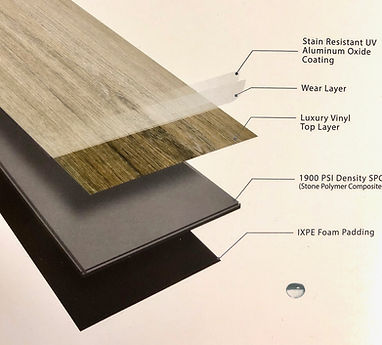
Luxury Vinyl Plank Flooring
What is Luxury Vinyl Plank Flooring?
Luxury vinyl plank flooring, commonly referred as LVT (luxury vinyl tile) and LVP (luxury vinyl plank), is a relatively new product in the market made with synthetic materials, producing a floor that is waterproof with a variety of decorative images on the surface. It usually has a clicking vinyl lock mechanism making it easy to install without the need to glue down to the sub-floor. A luxury vinyl tile is usually affordable and a good option for budget projects, rental properties and some residential projects.


Luxury Vinyl Plank Flooring Construction
Traditional luxury vinyl plank flooring, both LVT and LVP floors, are made with a synthetic material that is formed by mixing and melting polyvinyl chloride resins (PVC), white pigments, calcium carbonate, plasticizers, fungicide and UV stabilizers. These compounds are combined by using heat and pressure. The vinyl compound is then added to a backing layer.
A traditional luxury vinyl is created using four main layers:
-
Wear Layer – A transparent top coating that helps prevent against scratches, stains and fading.
-
Decorative Image – Gives the appearance (color, style, character) to the planks. It is a thin digital image that is adhered to the vinyl core.
-
Vinyl Core – The vinyl PVC material is the main component of an LVT or LVP floor. This core is flexible and 100% waterproof.
-
Backing Layer – This is a waterproof vinyl finishing layer that provides a soft cushion.

Santos Mahogany (Cabreuva)
Botanical Name:
Myroxylon Balsamum
Also Known as:
Estoraque (Peru), Cabriuva Vermelha (Brazil), Quina (Bolivia), Balsamo (Colombia), Sandalo (Ecuador), Quina Morada (Venezuela), Nava, Red Incienso.
Origin:
Brazil, Peru, Paraguay, Bolivia, Colombia, Panama, Guatemala and Mexico.
Pyinkado has beautiful deep reddish-brown tones with dark grain streaks or faintly veined darker lines. It turns to dark reddish-brown with aging. The grain varies from straight to broadly interlocked, sometimes wavy. Pynkado has high strength properties, and is very durable.


Benefits of Traditional Vinyl Plank Flooring
Waterproof: Vinyl flooring is a 100% waterproof material that can be installed in wet prone areas, such as a kitchen, foyer, bathroom, basement or cafe. A word of caution, in case of a significant water spill or flood, water will seep through the vinyl planks and lay on the sub-floor underneath the planks. Water trapped underneath must be dried or removed as it can cause moisture and humidity issues such as mold, mildew or fungus. Excessive water that is not dried can also affect the vinyl planks over time and cause cupping on the ends.
Application: Traditional vinyl plank flooring can be installed below, above or on grade. It can be installed virtually anywhere in your home or business.
Appearance: Today’s digital printing technology is better than ever. You can find beautiful LVT and LVP planks in a variety of looks, colors and styles. Textures are also popular with this type of flooring.
DIY Installation: You can find traditional vinyl in glue down or click lock installations. Both installations are DIY friendly, however, a click lock vinyl will be the easiest option. Traditional click lock vinyl does not require many tools.
Non-Slip – Vinyl flooring is anti-static and slip resistant. It is a good choice for bathrooms!
Comfort – LVT and LVP flooring will be softer and more comfortable under your feet than ceramic or porcelain tile. A thin vinyl, however, will be affected by the subfloor. If you’re installing a thin vinyl over a concrete subfloor, it will take on a harder feel than a plywood subfloor.
Affordability: Vinyl flooring is one of the most affordable flooring options on the market, especially if you’re looking for a waterproof option.
Easy Maintenance and Cleaning: An LVT or LVP vinyl is very easy to maintain. Regular sweeping and occasional deep cleaning is all that is necessary.


Cons of Traditional Vinyl Plank Flooring
Dents – Vinyl is a soft material. Although this material is durable, it can dent easily under heavy objects. You should always use padding under your furniture.
Stains – Vinyl is generally stain-resistant, but it is susceptible to stains when it comes in contact with some chemicals. Always choose mats without a rubber backing, as it can discolor vinyl.
Fading – Is very common with vinyl flooring in high sunlight areas. It is recommended to use blinds, rugs and move furniture often to avoid fading issues.
Recycling – Vinyl is a synthetic material that is non-biodegradable and hard to recycle. There are a few programs from manufacturers to recycle vinyl flooring, but it is not common. Most vinyl flooring will end up in landfills.


